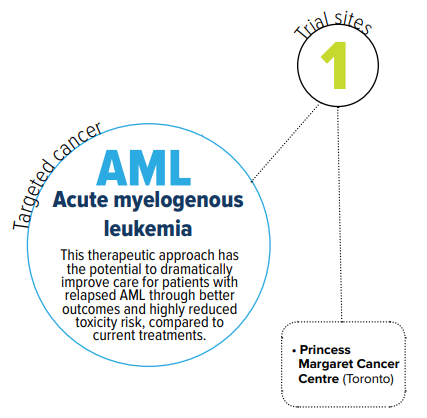Phase I Study of Autologous Acute Myelogenous Leukemia (AML) Cells Containing Lentivirus Engineering Expression of IL-12
Key Information
Who may qualify?
- Patients with AML and >=18 years of age
- Patients who have had their AML return or with a high likelihood of relapse
- Patients who have received prior treatment and are not in remission must have stable white blood cell count and are not receiving any chemotherapy or desiring further intensive treatment
- For full inclusion criteria, please click the link at the bottom of the page
Recruitment status
- Active; recruiting
Key words
- AML, leukemia, IL-12, bone marrow, donor, lentivirus

About the Trial
The immune system has the capacity to kill leukemia cells if properly instructed to do so. Some of the key instructions come in the form of soluble proteins that, if present in the right amounts, help immune system cells recognize leukemia cells and become activated to kill them.
The project team has previously shown that leukemia cells can be modified to secrete one of these proteins, called Interleukin 12, or IL-12. In experimental systems the leukemia cells secreting IL-12 stimulated a robust immune response that, once initiated, went on to kill all the residual leukemia cells even those not secreting IL-12. AML is a life-threating disease for which, in many cases, there is no curative treatment. This project will test the safety of infusing 10 to 12 patients with some of their own AML cells that have been genetically engineered to secrete IL-12.
The clinical trial will determine if an immune response has been initiated in both the patient’s blood and bone marrow as treatment proceeds. It will also monitor the treatment’s effect on the level of disease and follow each patient for two years.
This approach overcomes many of the challenges associated with current treatments using matched donor bone marrow. This approach can result in long-term immunological memory that is trained to recognize and attack cancer stem cells, by using a patient’s own cancer cells as a vaccine platform.
(https://bit.ly/2Drn3xW)
Clinical Trial #: NCT02483312

